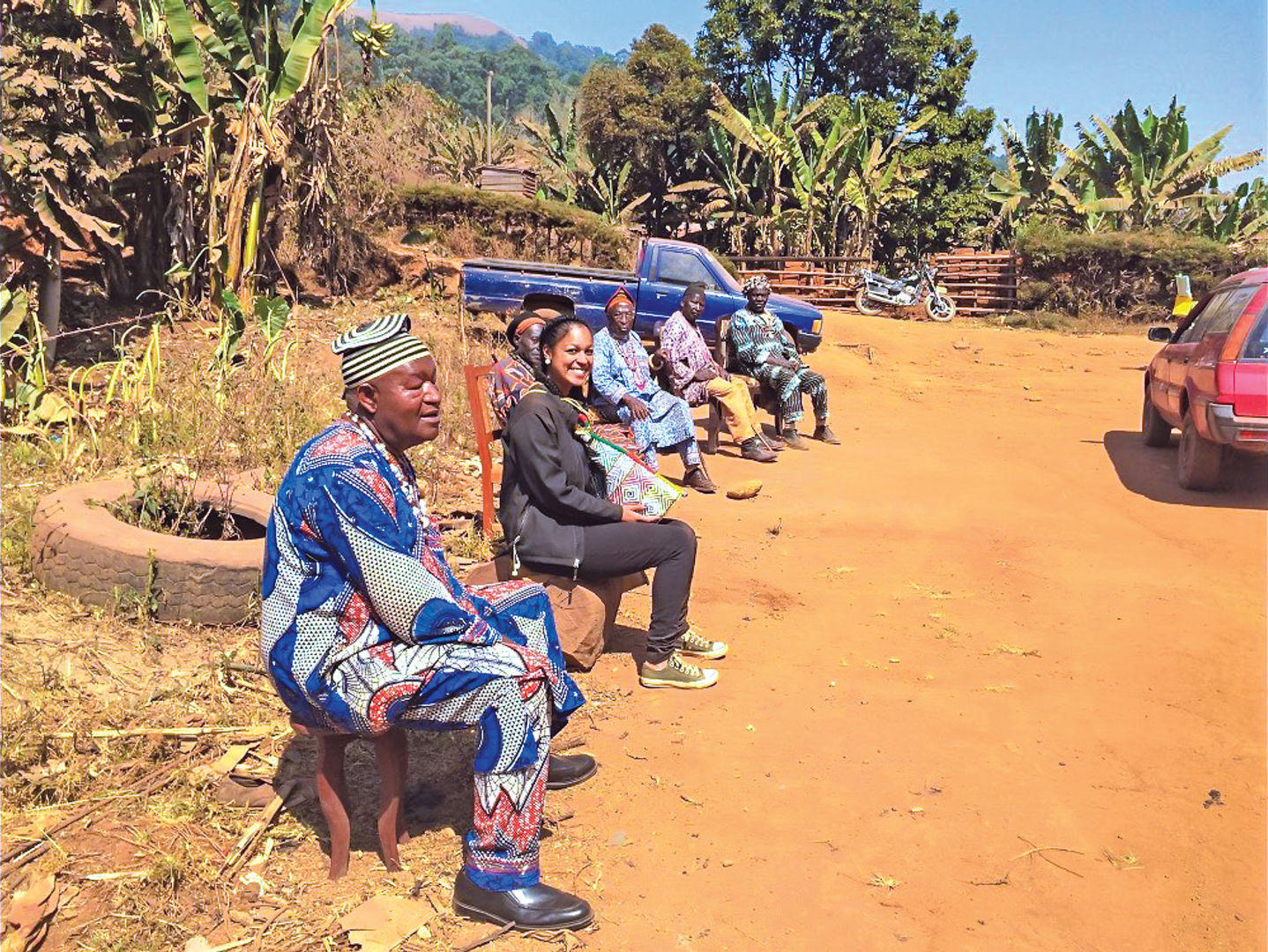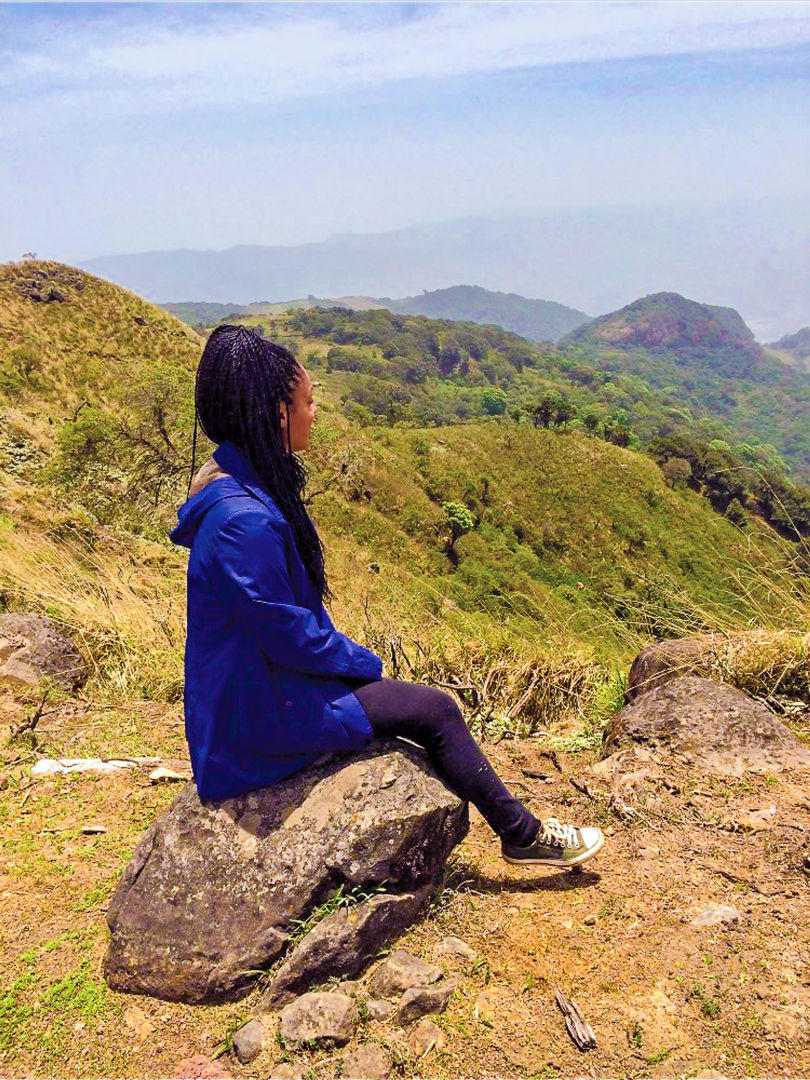The 29-year-old Lincolnton, Georgia, native, who majored in agricultural economics, served as an agribusiness volunteer from September 2014 to November 2016. She said the Peace Corps changed her life by giving her the opportunity to cultivate people’s perspectives.
“One of the most important things I learned while serving in Cameroon is that people make sense when you take the time to understand them,” Jones said. “Encountering unfamiliar situations, environments and people is hard. It requires walking in their shoes and immersing yourself in their environment, including their language, their culture and their history. It’s challenging, but the result is enlightening in the end.”
During her visit, Jones lived alone in a mud house in the northwest region of Cameroon in a rural village called Oku. “I had running water and also electricity maybe 40 percent of the time,” she said. The Peace Corps gave her a $350 monthly living allowance that paid for rent, food and local travel.
Jones said Oku is a montane forest region. Therefore, the climate is rather cool throughout the entire year. There are two distinct seasons in Cameroon and most African countries. “Dry season falls between November through March, and rainy season lasts through the months of April to October,” Jones explained.
Fully immersing herself in the Cameroonian culture, she made close friends with fellow volunteers and the people in her village.
“The people are kind and very welcoming,” Jones said. “They embrace you and want you to be a part of their family, culture and community.”
She also had to become accustomed to the food, which consisted mainly of a vegetable and rice with tomato or peanut sauce.
“Over time, it began to be good. Sometimes I would get frustrated because I wanted something different, but I got used to it. I miss it now. I go to African restaurants once or twice a week,” she admitted.
Although she was away from home for more than two years, Jones said she did not experience any homesickness and took advantage of the Peace Corps allowing 48 days of vacation time to visit home or travel.
During the first three months, volunteers have in-country pre-service training by Peace Corps staff, who are mostly hired, local trainers. Jones said this training covers technical, linguistic, cross-cultural, health, safety and security topics. She also mentioned that the Peace Corps stressed that volunteers learn French because it is Cameroon’s official language other than English.

“Since I was an agribusiness volunteer, we had intense agriculture and business training ‘the Cameroonian way.’ During this time, I was able to fathom how I could incorporate my educational training from FVSU and the University of Georgia (UGA) with the Cameroonian concepts and evolve prospective trainings and activities,” she said.
Jones said each training, activity or demonstration was always a learning opportunity for everyone involved, including her.
“It was an opportunity for me to share my knowledge and skills to community members, as well as a chance to embrace and understand their perspectives and way of doing things. Throughout my service, I think I probably learned more from them than they learned from me, which makes the whole experience gratifying and rewarding,” she said.
Utilizing all that she had learned, Jones facilitated many projects in Cameroon. The most memorable project involved implementing an income generating activity at the seven secondary schools in Oku based on their interest.
“One of the school cooperatives (Mboh Secondary School) expressed their passion of having a fishpond,” Jones said.
At first not too optimistic about the idea, she said the next week when she visited the school for a follow-up, the students had successfully built a fishpond. “I was so impressed and surprised,” she said.
Recently, Jones contacted the school and learned that the students are now selling the matured fish in the village and saving their earnings to build a bathroom in the school. “That made me really happy,” she said. “It’s amazing.”
Additionally, she conducted many trainings on self-sufficiency, bookkeeping and postharvest handling practices to reduce waste. She also trained youth on entrepreneurship and leadership skills.
“My overall goal was to strive to improve individuals or groups, economic opportunities at the household level, food security through business and financial literacy and help them to build capacity to manage their farms as businesses,” Jones said.
Furthermore, she promoted tree planting, conservation, restoration and reforestation to locals in the village and stakeholders.
“I assisted community members in preparing household gardens to grow a variety of vegetables. I encouraged them to do fruit tree cultivation, as well as introduced agroforestry techniques,” she said. “With all of the tools in Cameroon, I was able to create and design feasible projects that address those situations in conjunction with the expressed community needs.”
Jones said Fort Valley laid that foundation for her. During her senior year, her agricultural economics professor, Dr. Mohammed Ibrahim, presented the opportunity to volunteer with the Peace Corps during class.
At first unfamiliar about the Peace Corps and apprehensive about living abroad for two years, Jones said she eventually made it her goal to volunteer for the program as she became more interested in international agricultural development.

“I really wanted to go explore and understand how things work in those developing economic communities. I thought the Peace Corps was perfect for that,” she said.
Jones said she would definitely consider serving as a Peace Corps volunteer again. “It was a very enriching and rewarding experience,” she commented. “As a volunteer, you can only hope through your trainings, demonstrations and your overall involvement that you make a sustainable impact on the people.”
Her advice to others interested in serving in the Peace Corps is to go for it. “It could be one of the best things you will ever do. It was for me,” she said.
In addition to her undergraduate degree from FVSU, Jones has a Master of Science in agricultural and applied economics and a Master of Agricultural Leadership from UGA. She began working for the U.S. Department of Agriculture Rural Development agency in Washington D.C. in January 2017 as a management analyst. She said the best part of her job is serving communities that are unserved or underserved.
“I’m helping people, especially those who have trouble helping themselves,” she said.

